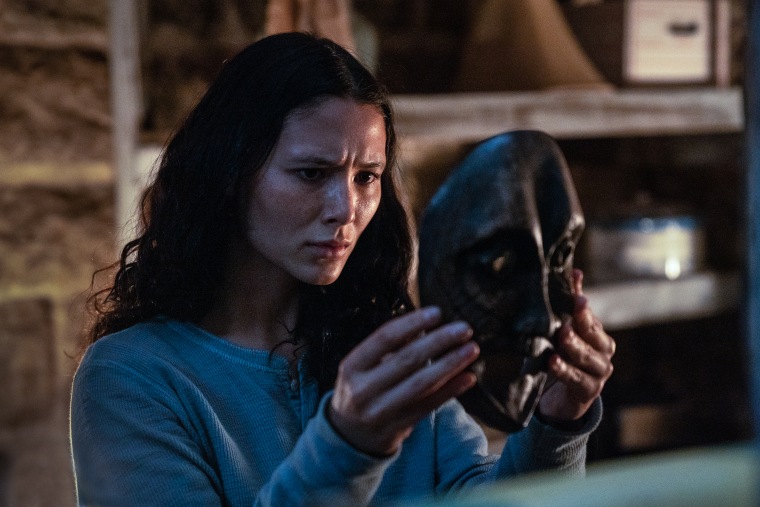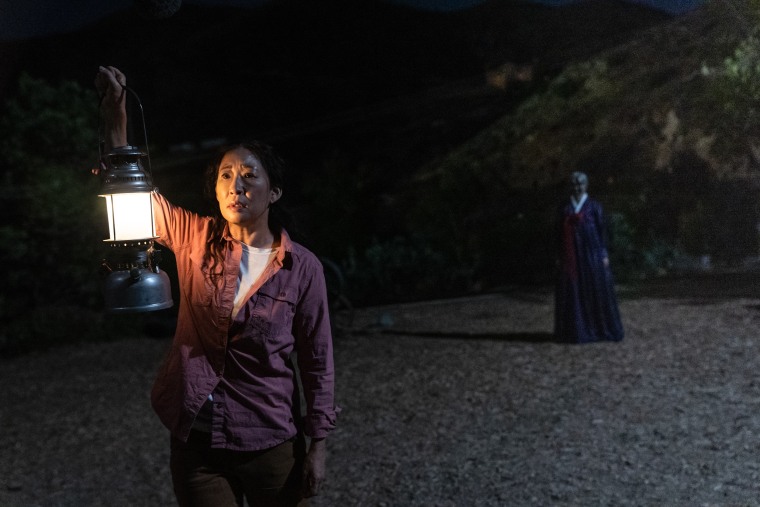For Asians across the diaspora, suffering experienced by previous generations often shapes the ways we're raised and move through life. In “Umma,” a horror movie starring Sandra Oh, a Korean American family is literally haunted by it.
Oh plays Amanda, a single mom and beekeeper whose fear of electricity keeps her disconnected from technology and the rest of the world. Her quiet life with her daughter (Fivel Stewart) is interrupted when a relative visits from Korea with the news that her mother (MeeWha Alana Lee) has died. With her remains left in a suitcase in their house, Amanda is haunted by the ghost of her mother, who died alone in Korea, and the fear of turning into her.
After Korean horror’s recent explosion in popularity, director Iris Shim’s “Umma” blends scares with concepts that cut deep for members of the diaspora. The guilt often passed from parent to child, the lack of acknowledgement of mental illness in immigrant families and the silent struggle of Asian mothers are themes that Shim said she was itching to explore on film.
Shim said she drew from her own life when portraying the complex and imperfect Asian mother-daughter relationships in “Umma.”
“I saw my mom bending over backwards to take care of her parents and take care of her husband’s parents,” she told NBC Asian America. “There was a moment where I saw my mom as the daughter. There is this sort of back and forth of mothers taking care of daughters and daughters taking care of mothers. It is almost this symbiotic kind of relationship.”
Horror seemed like the right medium through which to portray complicated feelings like guilt in a visceral way.
“It was like, how can I use the genre to bring to the surface some of the stuff that’s very internal,” she said. “Being able to see a literal version of someone turning into their mother, you can only kind of do in the genre space.”

Working with Oh was a dream come true, Shim said, and the “Grey’s Anatomy” actor was heavily involved in developing her character. “I wrote the role with her in mind,” she said. “We had a lot of conversations in the development stage talking about our own experiences. … We were also confronting the phase in our life when we’re really trying to recognize the humanity in our parents.”
When it came to portraying the generational trauma inherent for Asian women, Shim said there was a balance to be struck. Acknowledging our mothers’ failings in tandem with their individual suffering is important, she said.
In “Umma,” while Amanda’s mother is a ghost that terrorizes the family, emotional scenes also explore her trauma in migrating to the U.S., where she couldn’t speak the language, see her family or do things that used to make her happy.
“In most ghost and haunting type stories, the characters try to figure out how to banish the ghost,” she said. “What happens when the ghost is your mother? Despite how complicated that love is, it’s not that simple to just banish them.”
Representing Asian faces and storylines on screen is something Shim said she’s tried to do throughout her career. In telling a uniquely Korean American story, she said she hopes that “Umma” will allow those across the diaspora to relate.
“Growing up, whenever I did see Asian faces on screen, either they were films from Asia or they were small bit characters that were usually the butt of the joke,” she said. “Being able to actually explore the specific Asian American experience ... each of these characters has a foot in both worlds.”
"Umma" is exclusively in theaters on Friday.

